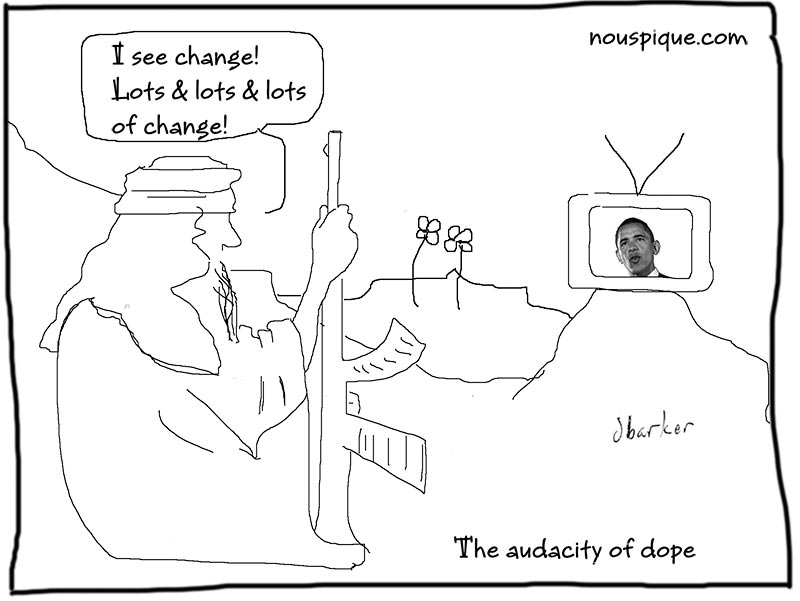
I had promised myself I wouldn’t write a “morning after” commentary, but I’ve grown tired of the grandiose electioneering rhetoric and of the even more grandiose claims of the election commentators. I can’t help but burst the bubble: Obama will fail. He will fail, not because his visionary talk has created impossibly high expectations, but because, with 338 electoral college votes confirmed thus far and more than 52% of the popular vote, the American people have given him a paradoxical mandate. Obama will never be able to resolve the paradox, and so, no matter what he does, he will fail.
On the one hand, the Obama camp has been saying that a vote for Obama is a vote for change. People have largely agreed on that point. The question that has divided American voters is whether or not the Obama brand of change is a good thing.
On the other hand, pundits say that the Democrat campaign had no decisive advantage until September’s credit crisis. They say that because McCain failed to distinguish himself from the suddenly unpopular economic policies of Bush, Obama became the only viable alternative. A vote for Obama was a vote against Bush. Or, to be more precise, a vote for Obama was a vote against the Bush of 2008 and a vote for the Bush of 2001 when prosperity was the watchword and the answer to terrorism was to mobilize the American people to undertake a gigantic shopping spree.
Now, the American people are mesmerized by the possibility of a repaired image abroad, an end to the needless deaths of troops in Iraq, universal health care, and better education opportunities for the disadvantaged. The American people yearn for a return to an optimism they haven’t felt since Kennedy pledged to put a consumer on the moon.
But the American people are equally mesmerized by the possibility of two SUV’s in every driveway, unsecured loans, six figure credit card limits, and reality programming on 120 inch big screen TV’s.
The American people have spoken and what they want is change – as long as everything stays the same. That is why Obama will fail.
The problem, of course, has nothing to do with Obama and everything to do with the nature of American prosperity. America has rationalized its prosperity with theories of wealth creation—the notion that it is possible to create wealth within a closed system, ex nihilo in a manner of speaking. However, this is a dubious theory—as dubious as the theory of earth’s creation ex nihilo by divine fiat, yet fraught with just as much mumbo jumbo. Theories of wealth creation allow America to ignore the obvious fact that America’s prosperity has not arisen ex nihilo nor within a closed system but has been financed by the rest of the world. “Financed” is a dainty euphemism for more pointed terms like “theft” and “exploitation.”
Consider the true cost of an SUV, or a running shoe, or a T-shirt. What would the price tag be if it captured the environmental damage of mineral extraction for raw materials, or atmospheric pollution from exhaust, or the leaching of dyes and glues into the water table after spent products have been dumped in landfill sites? What is the true cost in terms of lives lost to “stabilize” middle Eastern oil supplies? The true cost in terms of misery to secure favourable prices from manufacturers who engage in “deregulated” labour practices? America does not bear these costs. The rest of the world does and demands an accounting.
Throughout his campaign, Obama has demonstrated sensitivity to this fact, which explains his enormous popularity outside America. But domestically that accounting is going to be a tough sell. Already, we’ve heard how the most conservative amongst Republicans have demonized the “S” word: Obama is a socialist; he’s going to make the rich pay. Once the honeymoon is over and moderates realize that they, too, must contribute to this accounting, Obama’s political fortunes will probably wane.
When their backs are to the wall, most Americans would rather have the comfort of a smooth-riding SUV than the warm and fuzzy feeling of a fine ideal. That’s why Obama will fail.
Note that when I use the term “American people” I risk making a gross generalization. I acknowledge that there is an enormous groundswell within America that stands in solidarity with the rest of the world, that repudiates America’s military presence abroad and eschews a culture of absolute entitlement. I acknowledge, too, that other Western countries (most notably Canada) engage to some degree in the same exploitative practices which I describe here as “American.” I use the terms “America” and “American people” to denote an ideology, not an actual group of people.